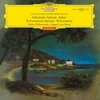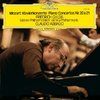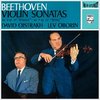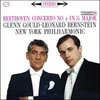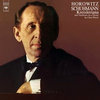AAA 100% Analogue This LP was Remastered using Pure Analogue Components Only from the Master Tapes through to the Cutting Head
Speakers Corner / Columbia - MS 6128 - 180 Gram Virgin Vinyl
AAA 100% Analogue - Audiophile Mastering - MS 6128 Columbia Masterworks
Pressed at Pallas in Germany - Limited Edition
Conducted by Eugene Ormandy, pianist Rudolf Serkin with the Columbia Symphony Orchestra perform Piano Concertos by Felix Mendelssohn-Bartholdy.
That Mendelssohn was a genial composer and piano virtuoso is very evident in his piano concertos. Written in his youth, his first piano concerto is full of élan and power, with grand gestures in the themes and an early masterly command of symphonic development, which is continued – though rather more subtly in the second. This music also testifies to the 22-year-old’s superb command of his favorite instrument. To this day young pianists at music competitions all over the globe emulate such artistry.
Such Olympian efforts were not for Rudolf Serkin, who approached the virtuoso works at the end of the Fifties with all the maturity of a 'grandseigneur'. With amazing accuracy and the most delicate touch he unfolds the tightly-knit music, illuminating the flowing melodies and figures with a candid, clear brightness and thereby painting a warm, romantic and colorful landscape with finely- yet firmly-drawn lines.
Despite being boisterous, tuneful - yet elegant - works, Mendelssohn’s Piano Concerto’s have
never really become popular. In both the soloist appears in the opening bars, and there is no gap
between the movements. The First is more successful because it sounds fresher and avoids the note-spinning found in the Second; although in the wrong hands both works can sound shallow.
Fortunately Rudolf Serkin was a great Mendelssohn pianist (as his BBC Legends performance of the Prelude & Fugue in E minor and various pirate versions of the Variations sérieuses amply demonstrate) and the way he launches into the G minor Concerto is electrifying, with superb rhythmic, dynamic and pedal control. He slows slightly for the second subject, and by completely changing his tonal palette, makes it sound Chopinesque, while the development combines subtle rubato and minor tempo variation with passages of real power. No-one has equalled his playing of the beautiful slow movement, where the ethereal, crystalline, glowing tone creates an exquisite cantabile line that should be required listening for all students of the piano. The finale is marked
Molto allegro e vivace; here Serkin’s approach is very direct and muscular, the sheer force of
personality and intellectual grasp behind the notes is almost intimidating, and one can say exactly
the same about the D minor Concerto, where the playing is similarly uncompromising. Ormandy
and the Philadelphia Orchestra are powerful, responsive partners, and because they came from a pre-authentic era, the orchestra sounds to be – thankfully – at full-strength.
Thanks are due to the wonderful recording technicians whose expertise has made this LP a true masterpiece.
Rudolf Serkin, piano
Columbia Symphony Orchestra
Eugene Ormandy, conductor
Selections:
Felix Mendelssohn-Bartholdy
1. Concerto for Piano & Orchestra No. 1
2. Concerto for Piano & Orchestra No. 2
Recording: December 1957 and October 1959 at Broadwood Hotel, Philadelphia, by Stan Tonkel
Production: Thomas Frost

20 Years pure Analogue
Are your records completely analogue?
Yes! This we guarantee!
As a matter of principle, only analogue masters are used, and the necessary cutting delay is also analogue. All our cutting engineers use only Neumann cutting consoles, and these too are analogue. The only exception is where a recording has been made – either partly or entirely – using digital technology, but we do not have such items in our catalogue at the present time
Are your records cut from the original masters?
In our re-releases it is our aim to faithfully reproduce the original intentions of the musicians and recording engineers which, however, could not be realised at the time due to technical limitations. Faithfulness to the original is our top priority, not the interpretation of the original: there is no such thing as a “Speakers Corner Sound”. Naturally, the best results are obtained when the original master is used. Therefore we always try to locate these and use them for cutting. Should this not be possible, – because the original tape is defective or has disappeared, for example – we do accept a first-generation copy. But this remains an absolute exception for us.
Who cuts the records?
In order to obtain the most faithful reproduction of the original, we have the lacquers cut on the spot, by engineers who, on the whole, have been dealing with such tapes for many years. Some are even cut by the very same engineer who cut the original lacquers of the first release. Over the years the following engineers have been and still are working for us: Tony Hawkins, Willem Makkee, Kevin Gray, Maarten de Boer, Scott Hull, and Ray Staff, to name but a few.
At the beginning of the ‘90s, in the early days of audiophile vinyl re-releases, the reissue policy was fairly straightforward. Companies such as DCC Compact Classics, Mobile Fidelity, Classic Records and others, including of course Speakers Corner, all maintained a mutual, unwritten code of ethics: we would manufacture records sourced only from analogue tapes.
Vinyl’s newfound popularity has led many other companies to jump on the bandwagon in the hope of securing a corner of the market. Very often they are not so ethical and use every imaginable source from which to master: CDs, LPs, digital files and even MP3s.
Even some who do use an analogue tape source employ a digital delay line, a misguided ’80s and ‘90s digital technology that replaces the analogue preview head originally used to “tell” the cutter head in advance what was about to happen musically, so it could adjust the groove “pitch” (the distance between the grooves) to make room for wide dynamic swings and large low frequency excursions. Over time analogue preview heads became more rare and thus expensive.
So while the low bit rate (less resolution than a 16 bit CD) digital delay line is less expensive and easier to use than an analogue “preview head”, its use, ironically, results in lacquers cut from the low bit rate digital signal instead of from the analogue source!
Speakers Corner wishes to make clear that it produces lacquers using only original master tapes and an entirely analogue cutting system. New metal stampers used to press records are produced from that lacquer. The only exceptions are when existing metal parts are superior to new ones that might be cut, which includes our release of “Elvis is Back”, which was cut by Stan Ricker or several titles from our Philips Classics series, where were cut in the 1990s using original master tapes by Willem Makkee at the Emil Berliner Studios. In those cases we used only the original “mother” to produce new stampers.
In addition, we admit to having one digital recording in our catalogue: Alan Parsons’ “Eye in the Sky”, which was recorded digitally but mixed to analogue tape that we used to cut lacquers.
In closing, we want to insure our loyal customers that, with but a few exceptions as noted, our releases are “AAA”— analogue tape, an all analogue cutting system, and newly cut lacquers.
PALLAS
Audiophile Vinyl - Made in Germany For over 60 years the family business in the third generation of the special personal service and quality "Made by Pallas" is known worldwide. Our custom PVC formulation produces consistently high pressing quality with the lowest surface noise in the industry. Our PVC complies with 2015 European environmental standards and does not contain toxic materials such as Lead, Cadmium or Toluene. Our vinyl is both audiophile and eco-grade!




